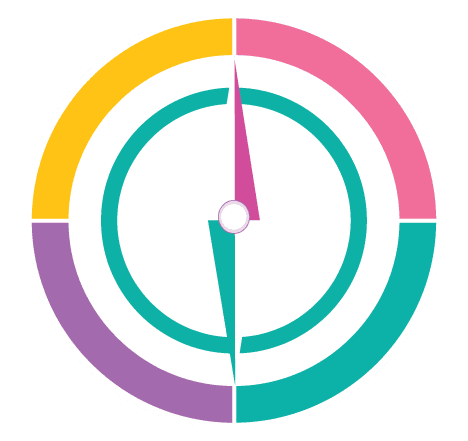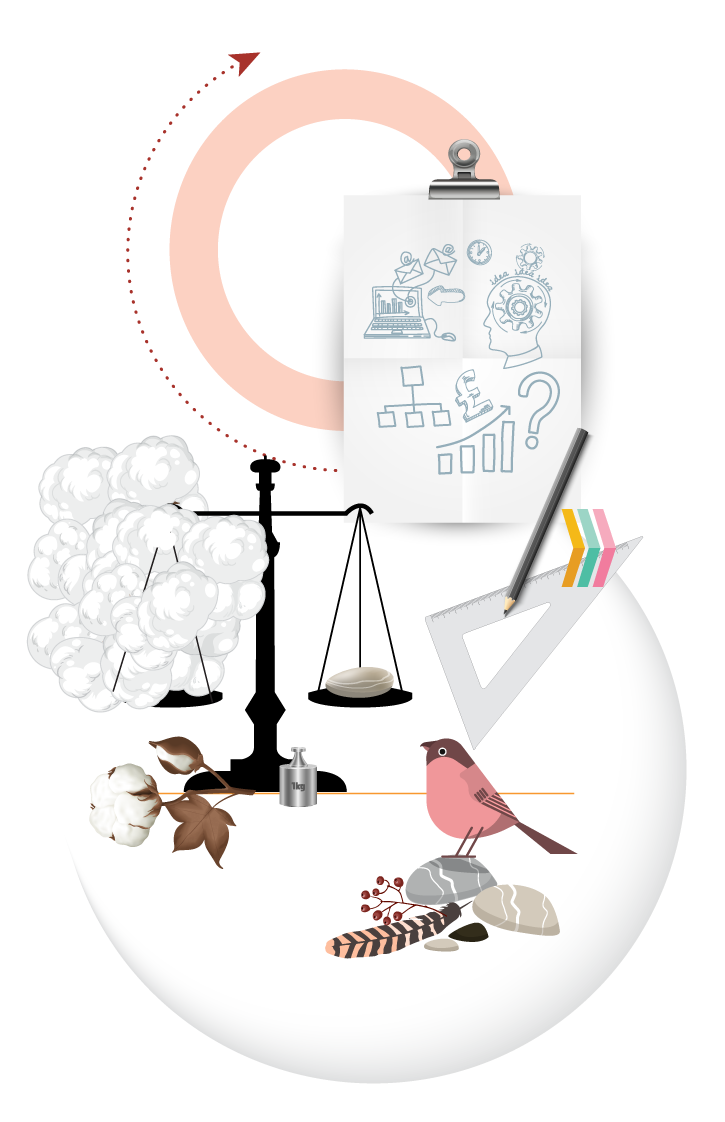Critical Thinking
Critical thinking skills are considered to be one of the most essential capabilities for achieving success in the 21st century. The most obvious reason is the avalanche of digitally delivered information. This requires people to be smart at evaluating, sifting and selecting information that may benefit them professionally and personally.
By placing emphasis on the learner as an active agent of his or her own learning, the R@W model shifts the perspective from general critical thinking—which is the mainstream approach in contemporary education—to individual self-reflection. The learner, therefore, doesn’t seek to justify what is generally accepted by the society or group he or she is affiliated with. Instead, they seek to understand their individual relation to the information they are exposed to or gather for their learning task.
In R@W, all dimensions of learning are assembled in a dynamic ripplework system. These dimensions are intertwined and dependent on one another, but each of them plays its own role in activating and sustaining learning.
Critical self-reflection in the learning group takes place as a result of communication, collaboration, and the creative process. Throughout the interactions in these dimensions, the task of the learner is to become: a) an active agent in promoting his or her interests and abilities; b) a teammate sensitive and considerate of other people’s needs and interests; and c) a conscious observer of his or her own performance. This means that students involved in a R@W learning project are not learning material to pass a test; they are shaping themselves to become, ultimately, their own agents—creators of their own lives.
Critical Self-Reflection and Feedback Loops
As already discussed on other pages of this website, feedback loops in R@W are about communicating with the environment (natural, social, and technological—NST), interpreting ‘what it says’, and looking for ways to take better control of your next step in the learning task.
In other words, feedback loops in our learning model are not simply reflections received periodically from other people.
In R@W, feedback loops constitute a system that governs the learning process.
With the Use of Feedback Loops, Students Understand that:
They learn through interactions with the NST surroundings;
These interactions are oriented towards learning by following their interests, using their existing knowledge to gain new insights, as well as promoting their natural abilities and gifts.
In the learning project, their dispositions and skills are in tension with the interests, existing knowledge, abilities, and natural gifts of others: the learning group, family/community members, friends, social media friends, social media affinity groups, and practising professional interviewees, etc.
To gather data for the learning project, individuals analyze, interpret and experiment with it, leading to interactions with the natural and technological aspects of their surroundings. These interactions are also guided by individuals’ personal preferences. Through contact with natural and technological objects, individuals act on them, learn about their properties, and test what can be done with the elements. Ultimately, this leads to changes in themselves.
These activities are interpreted through the lens of their personal traits.
It is this interpretation that provides data for continuous self-reflection.
In R@W, the process of self-reflection is documented in an individual multimodal journal (MJ). The student keeps the MJ by reflecting on daily learning activities. Their focus isn’t on determining ‘what worked well’ and ‘what didn’t work well’ after the task has been completed. The student reflects on his or her learning progress when the gathered data is fresh, their experience is saturated with emotions, and the uncertainty of the next step is present. In short, when they need these reflections most.
That is what constitutes the continuous feedback looping system. The learner develops the ability to consciously observe their activities, interpret them, and use the feedback to design a unique repertoire of personal knowledge and life-savvy skills.
Critical self-reflection in R@W is a metacognitive process
In R@W, traditional self-reflective questions such as “what worked well” and “what did not work well” are replaced by higher-order questions that the individual student learns to ask themselves about their own cognitive processes.
The Questions Can Be:
—observational and reflective,
for example:
- How did I learn by:
a) gathering data—taking photos, recording audio/video, making sketches of places, natural or man-made objects, animals or people;
b) conducting interviews;
c) discussing the findings with the group;
d) working with my MJ?
—analytical,
for example:
- Why did I feel annoyed doing this when other people in my group enjoyed it (or the other way around)?
- Why do I have a different opinion from the people in my group?
- Why did the quality of knowledge other people in my group had gathered appear to be unreliable or insufficient?
- Do I choose this point of view only because I want to be liked by others?
- How strongly do I feel about my point of view, and why?
- What did I notice that others didn’t? Or why didn’t I notice what others did?
- Why can’t I make that person in my group who talks too much listen to me?
—strategic,
for example:
- How can I get the person in my group who talks too much to listen to me?
- Do I have to stand my ground in proving my point? How?
- What data do I have to get to make my argument stronger?
- How much and in what ways would our learning be affected if we followed the route suggested by that person in our group?
- How can I prove that?
The R@W system of critical self-reflection by feedback looping is designed to help students to develop their own management system through a dynamic flow of interactions between themselves and their surroundings.
By intentionally and repeatedly asking themselves questions, analyzing and developing strategies for transformation, and developing unique skills in evaluating new information, R@W learners act as their own knowledge-producing agents.

